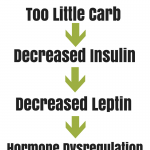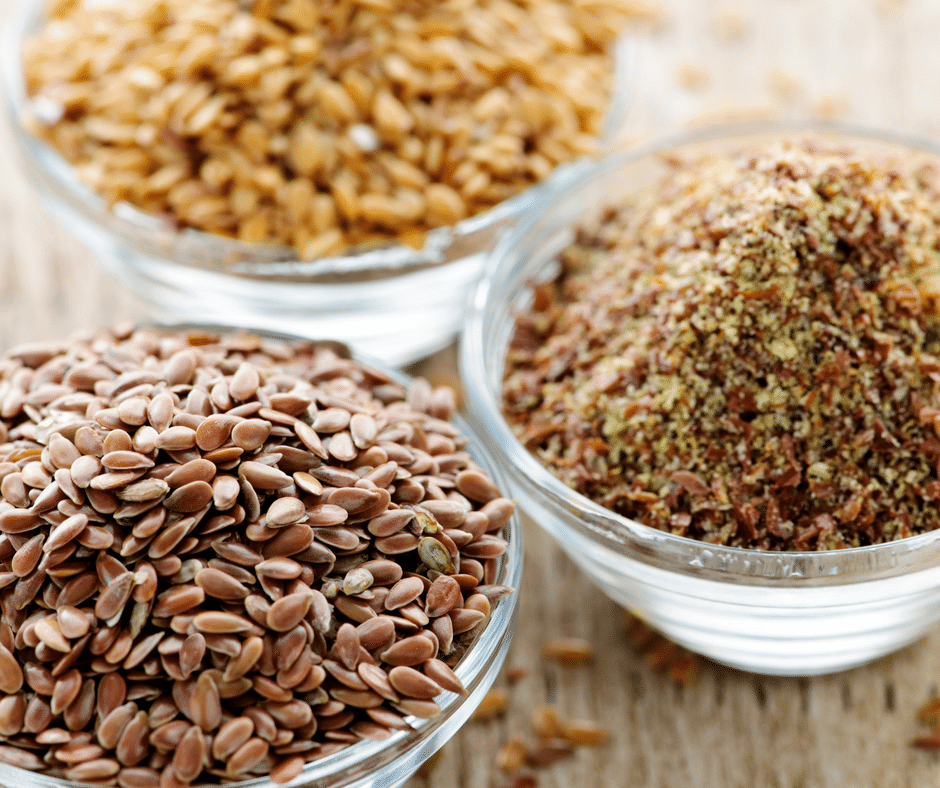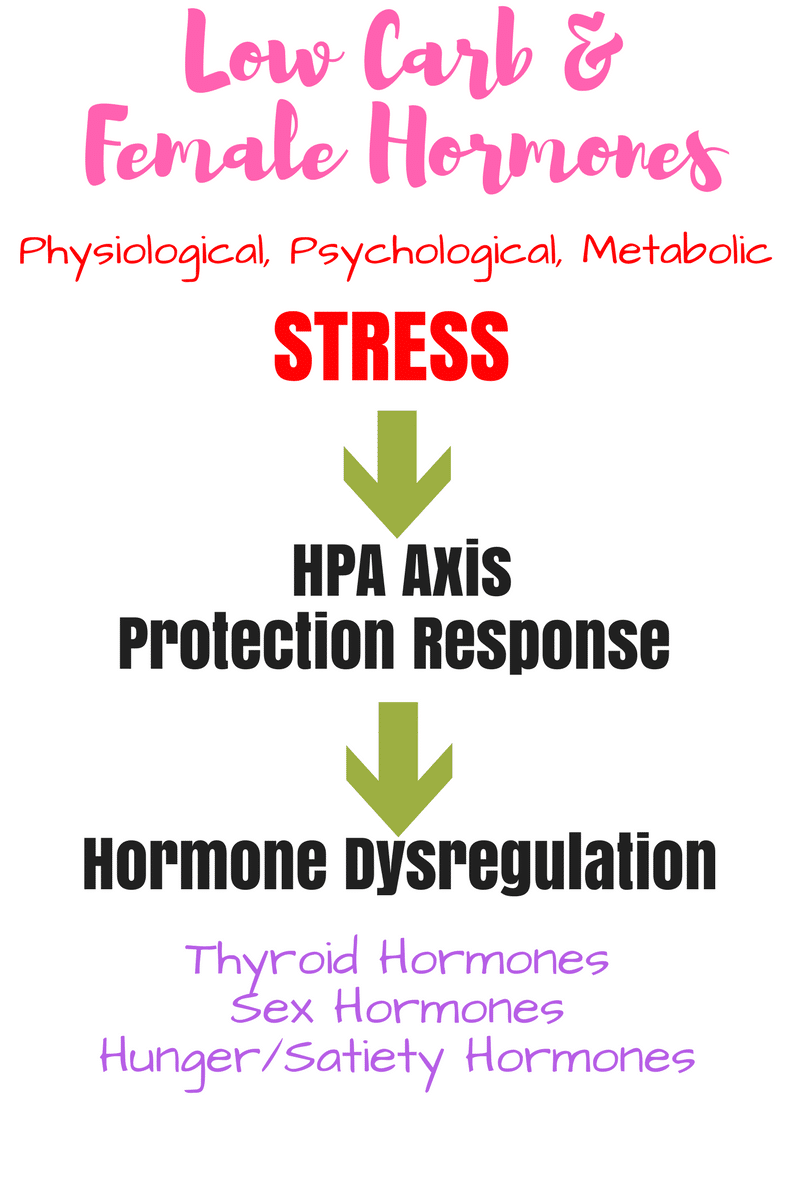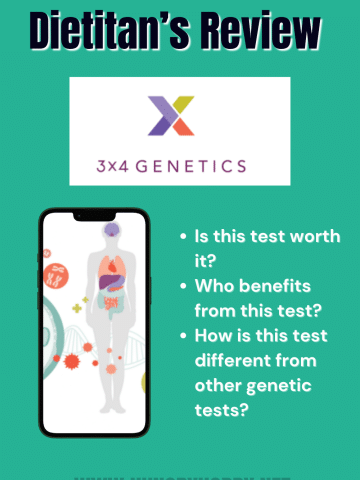Hey, guys, today we are back to period talk. So what I should say is hey ladies it's time to talk periods again. Guys, if you aren't into this, that's 100% understandable, and you can join us again tomorrow for a new recipe. However, if you have females in your life you care about (wife, girlfriend, sister, mother, friend) who is struggling with missing or irregular periods, or even worse, infertility. Please send this along or hang out with us and then pass the information along! Especially read this if you are a dude in the fitness industry making diet recommendations. Okay, cool, now let's get to it!

Recently I've had an alarming number of comments on a few of my posts related to hormone balance (see the bottom of this post for related posts) about women following a low-carb diet. Many of these women are struggling with longstanding amenorrhea, irregular periods, and potential infertility. I felt it necessary to point out that there are cases in which a low carb diet is appropriate, but there are also times when this may cause further damage and prevent the return of a normal cycle.
Remember
Remember, all my recommendations here are all in the context of hormone balance. I'm particular discussing those women who are well before menopause. Let's say they are between the ages of 20-40 ish. They are wishing to regain regular cycles and potentially restore fertility (without or without the goal of getting pregnant.) Second, remember I'm only going to skim the surface with this incredibly complex topic. I can't press upon you enough that you need to work with someone skilled and experienced in hormone balance to help you regain natural cycles. You can read my story and 15 other people's stories, and likely not get very far at regaining your cycle. Your story is individual, and you need someone to help you tease out all the intricacies of your story. Beyond just what you weigh and how much your body fat percentage is, the story is likely deeper than that. If you haven't sought counsel yet, please do. If you want to work with me, you can visit my nutrition services website for packages. As someone who has been in your shoes, I understand the frustrations, fears, and heartache dealing with these delicate issues. I make the most of my experience by taking the knowledge I have gained and helping others. I recommend highly researching whoever you choose to help you on this journey. They should never put you on a standardized protocol. You really need someone that knows where you have have been. Amenorrhea is a physical and mental struggle, you need patience, kindness, complete trust and understanding to recover from it. Please stop struggling through it on your own. Okay, now onward for some things to think about.
When A Low Carb Diet Might Be Appropriate
- Conditions of insulin resistance such as PCOS
- Conditions of insulin resistance such as Diabetes or pre-diabetes
- Conditions of GI distress such as SIBO or yeast issues
- Conditions such as seizures or potentially neurodegenerative
- If you need to lose more than 10 pounds
- If your activity is limited
- other conditions not listed
When You Might Need More Carbohydrates
- If you are having trouble sleeping
- If you have thyroid concerns
- If you are highly active and/or if you are not recovering well from your workouts
- If you are within 10 pounds of your goal weight
- If you are experiencing menstrual irregularities or amenorrhea
- If you are pregnant or breastfeeding
Healthy Fats vs. Carbohydrates
The reason I wanted to write this post is that I too fell into this trap. Sex hormones use cholesterol as the backbone of their chemical structure. Therefore, it would stand to reason that high cholesterol and fat intakes would help promote hormone production. It's true that studies have found that higher intakes of saturated fats do support increased estrogen levels. * So more fats in your diet is definitely a good idea if you are trying to regain your cycle. However, as you guys know, I'm a fan of seed cycling with supplemented omega 3 and GLA. These fats are anti-inflammatory and also have directly been shown to have hormone regulating properties. However, I'm not sure that they would work in conjunction with a low carb diet unless the situation was appropriate. I tried seed cycling, albeit with a different protocol, but I was also low carb at the time, and it didn't work.
Here are a few things to think about, some of the people writing most about amenorrhea on the internet state they solved their issue with a high fat keto style diet. Keep in mind the people recommending these diets, saying that it helped them could have certainly had conditions stated above that were undiagnosed. Something I had never thought of till after I regained my cycle.
The HPA Axis (aka the command center)
If you are suffering from post-pill amenorrhea or hypothalamic amenorrhea, you need to consider the HPA axis to understand why carbs might be a crucial piece of the puzzle.
- Hypothalamus located in in the brain.
- Pituitary located in the brain.
- Adrenals located in the kidneys.
The HPA axis is tricky, but in a nutshell, it controls the cascade of hormone response int he body and is very sensitive to chronic stress. You may read elsewhere that it does a decent job of handling acute stress, but that depends on what your idea of a "decent job is."
For example, it's not infrequent for women to report delayed periods due to experiencing a higher than the average earthquake. I'm talking a one-time, one-day event that doesn't have long-lasting consequences (such as a larger earthquake or the dealing with hurricane aftermath) still; the event delays some women's cycles by 1 to 20 or more days. So sensitivity is something that needs to be considered.
Here is how it works, chronic stress leads to the production of cortisol. Cortisol is part of the flight or fight response. It energizes you preparing you to run or fight the tiger. The HPA axis is the hypothalamus, pituitary, and adrenals working together to downregulate things that may hinder your survival, like becoming pregnant. It may also attempt to make your metabolic rate more efficient by downregulating your thyroid. When your thyroid is downregulated, you need fewer calories to function efficiently. So your basal metabolic rate (about of calories required to keep you alive) lowers. Obviously, in the 21st century, with an overabundance of food available, you want to be less efficient at your use of calories, not more.
Keep in mind stress comes in all different forms. This is the hardest part, figuring out which thing or what combination of things is the issue for you. It could be physiological stress like too much exercise. Psychological stress, like being in grad school, working 70 hours a week, or being in a bad relationship. Metabolic stress could be caused by too low calories or too little carbs.
Leptin, yet another hormone.
This is where we need to introduce yet another hormone. Leptin interacts with sex hormones and the HPA axis. One time, during my five years with missing periods I went to an endocrinologist. I only saw one because my experience with her was so terrible. She looked at me and said, "I don't know why you aren't having your period, I guess we could run a leptin test." I was vaguely familiar with the idea of leptin from my training as a dietitian, but I only knew of it. I didn't understand its impact on reproductive health at all. Receptors for leptin have been identified on the ovaries, so it would stand to reason that it has some effect on them. Turns out the effect is more than "you guess you should run a leptin test." Leptin circulates in the blood and signals whether sufficient energy needs are being met. Insulin levels promote leptin sensitivity and leptin levels, so if you are eating a low-carb diet, you produce less insulin needed to metabolize carbohydrate and therefore less leptin. Leptin is also associated with body fat stores, the more body fat typically, the more leptin you have. So, if calorie reserves are small, carbohydrate intake is low, and you are lean it may be sending a stress signal to the HPA axis indicating there is not enough energy to support you, much less a baby, hence reproductive shut down. Here is the kicker, EVEN if you are at a normal weight or even overweight your body may think it's starving because of too low energy intake or carbohydrate intake. Your body starts changing it's set points, and things do get more complicated from there. I'm 100% sure that my low carb diet at least contributed to the problem for me, but I'm also 100% sure it wasn't that only issue. Like I said, the body is complex and complicated, it attempts to protect itself sometimes end up doing harm. Our bodies were built to protect against different types of starvation and different types of stress then we have today is basically what it comes down too.
I can't give you a formula that says how much you need; I just can't. If you were my client I would assess your history, the factors potentially contributing to the HPA axis dysfunction, and current intake before coming up with a recommendation. We would then monitor and adjust from there while using an intuitive eating approach. What I can tell you is a low-carb diet may be directly related if not one of the causes of HPA dysfunction causing your amenorrhea provided you are not diagnosed with a condition signifying the need for a low-carb diet. Carbohydrates are likely one of the missing pieces to the puzzle that I would definitely recommend exploring! I hope that helps answer some questions!
Related Posts on Hormone Balancing:
- Recovering from 5 Years of Amenorrhea
- Post-Pill Amenorrhea Update (4 months later)
- Seed Cycling for amenorrhea, irregular cycles, and hormone balance
- How to Make Your Hormones Work For You (What to eat/how to train)
- Iron Foods, Functions, and Facts (related)
- My friend Ashley wrote an ebook called Fit & Fertile (affiliate link)about her experience with Amenorrhea as a Group Fitness Instructor and what she did to get pregnant naturally. Her experience was different t n mine, but similar in some ways as well. Either way, it was definitely a comforting read.
Posts Related to Carbohydrates:
If you have experience with this, we would love for you to share your story! The more stories we can hear the more comfort we find, but please remember this is a sensitive topic, take care with your commenting!









Carly says
Have you read No Period, Now What? By Nicola Rinaldi? You would probably enjoy it. She's a PhD from MIT and did a wealth of research on Hypothalamic Amenorrhea after struggling with it herself. I've known her for years and she is brilliant 🙂
Kelli Shallal MPH RD says
No I haven't! I'll pick up a copy!
Jenn says
I just discovered your blog today and I can't read enough. I've struggled amennorhea for years off and on, and at this point haven't had a period in over 6 months. At one point, my period went missing for 2 years. Your stories of what people (including doctors) say to you about not being "that skinny" happens all the time. They never think how worrisome it is that you have this problem, and have zero idea how to fix it. I'm 38 and recently had my hormones tested to see if I'm in menopause. Hormone levels were all normal aka consistent with my age. Neither my regular doctor nor my naturopath have a solution. I read your seed cycling post and wonder if I should follow that protocol instead of the one I just started a week ago (traditional one you see everywhere with pumpkin seeds in days 1-14 and no chia or hemp.) However, I follow a low to no carb diet and workout 7 days per week. It sounds like the seed cycling may not do much for me in that case? But seems worth it to try.
Do you have a meal plan to show what a typical day of meals looks like in each phase of your cycle? I feel like that'd be so helpful.
Thank you so much for sharing your story and these resources. I finally feel like I'm not alone.
Kelli Shallal MPH RD says
I know how isolating it feels so I'm glad you feel like you aren't alone! I don't have a meal plan, but I do have recipes for each phase in the original seed cycling post. It sounds like you might need to tweak your diet a bit to help get things back on track in addition to the seed cycling. Unfortunately, as you already know each case is individual but I'd be happy to work with you one on one in nutrition coaching. I have helped so many women get their cycles back by helping them craft a plan that is individual to them!
Michelle says
SO great to read this!! I just got my period back after about 5 years of NOTHING. Over that amount of time, i went back to incorporating healthy meats into my diet (great for the lackluster appearance and chronic coldness, nothing for menstruation), tried increasing my fats, cut out wheat (great for GI and eczema, again nothing for periods), massively decreased exercise (just depressed me), increased overall calorie consumption (felt closer, but no actual blood), and FINALLY the past couple months, I really increased carbs specifically...and BOOM!! Here's to eventually regulating, but now I at least feel empowered- like my body is running correctly!
And no ladies, I haven't gained a ton of weight! I can still work out hard and build muscle, and have a period! Eat that rice! Eat those veggie chips! Enjoy more fruit! Eat all the potatoes!! Ha! I'm a Dietetic Technician, and it took me forever to figure it out- I hope more ladies don't have to wait as long as some of us!:)
Kelli Shallal MPH RD says
LOVE THIS! thank you so much for sharing! The more we share our stories the more women will benefit!
Kim Click says
How many carbs are you eating?? I’m really struggling with this. I haven’t had a period for years either and sounds like I have tried everything like you. The problem is reintroducing carbs make me feel terrible so I keep going back to low carb.
Kelli Shallal MPH RD says
The amount of carbs someone needs is a really individual thing and the path to getting your period back is as well. I've helped hundreds of women get their periods back I highly recommend signing up for a consult so we can map at your individual path. I really wish I could just write a post that would fix everything for all women but unfortunately, you truly need a unique plan. There could be a million reasons why your not feeling good eating carbs and we need to get to the bottom of it.